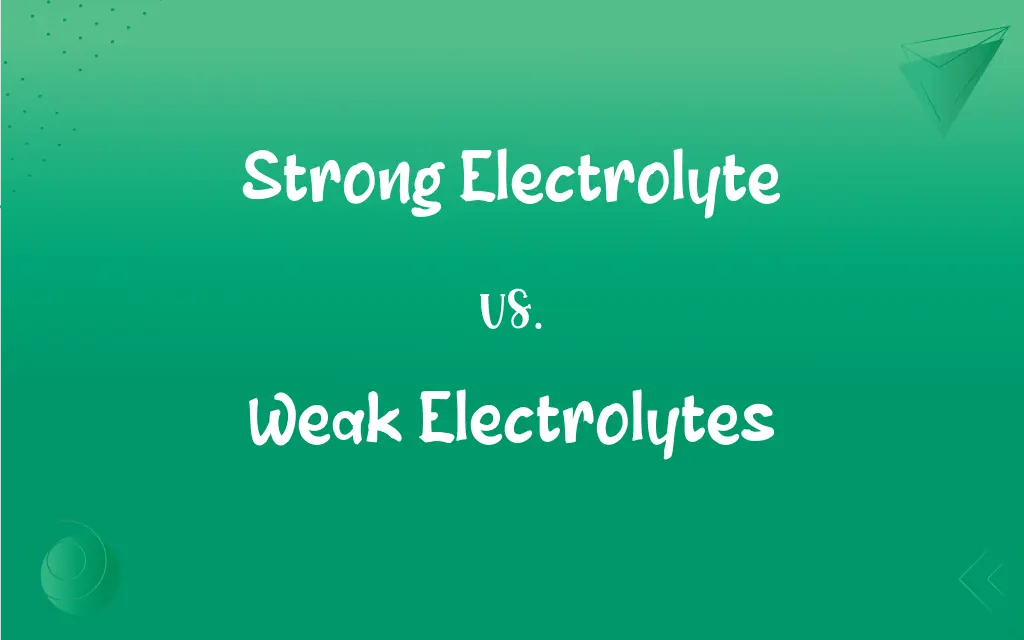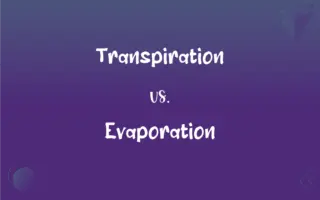Strong Electrolyte vs. Weak Electrolytes: What's the Difference?
Edited by Aimie Carlson || By Harlon Moss || Updated on October 10, 2023
Strong electrolytes completely dissociate into ions in solution, providing high conductivity; weak electrolytes only partially dissociate, resulting in low conductivity.

Key Differences
Strong electrolytes, by definition, are substances that completely dissociate into ions when dissolved in a solvent, typically water. This full dissociation results in a solution with high ionic conductivity. In contrast, weak electrolytes only partially dissociate in solution, leading to a lesser degree of ionic conductivity. This distinction in ion production markedly separates the electrical conducting abilities of these two electrolyte types.
When we speak about strong electrolytes, we refer to substances like sodium chloride (NaCl) that, when dissolved, break down entirely into their constituent ions, in this case, Na+ and Cl-. The case of weak electrolytes, such as acetic acid (CH3COOH), is different; they partially dissociate into ions (CH3COO- and H+), and a significant portion remains un-ionized in the solution, leading to a lower concentration of ions compared to strong electrolytes.
Interestingly, the nature of the solute defines whether an electrolyte is strong or weak. Strong electrolytes are often ionic salts, strong acids, or strong bases that thoroughly break down into ions in solution. On the contrary, weak electrolytes include weak acids and weak bases that do not fully ionize in the solution, hence producing fewer ions and showcasing reduced electrical conductivity.
In practical applications, the behavior of strong electrolytes is critical in battery technologies and electroplating, where high ion concentrations are pivotal. Weak electrolytes, on the other hand, find their utility in processes and biological systems where a delicate ionic balance and gradual ion release are crucial, illustrating that both types have unique significance in various scientific and industrial contexts.
In summary, the degree of dissociation into ions in a solution underpins the primary distinction between strong electrolytes and weak electrolytes. The former facilitates a robust conductive environment due to the abundant ions, while the latter ensures a milder ionic environment due to its partial dissociation. Both play indispensable roles in different chemical, biological, and industrial processes, underlining their respective importances in science.
ADVERTISEMENT
Comparison Chart
Degree of Dissociation
Completely dissociates into ions
Partially dissociates into ions
Ionic Concentration
High
Low
Electrical Conductivity
High
Low
Examples
Sodium chloride (NaCl), Hydrochloric acid (HCl)
Acetic acid (CH3COOH), Ammonia (NH3)
Application Contexts
Predominantly in batteries and electroplating
Often utilized in biological systems and certain reactions
ADVERTISEMENT
Strong Electrolyte and Weak Electrolytes Definitions
Strong Electrolyte
They display high electrical conductivity due to their complete ionization.
Because NaOH is a strong electrolyte, its solution is highly conductive.
Weak Electrolytes
Weak electrolytes establish an equilibrium between ionized and non-ionized species in solution.
In a solution of HF, an equilibrium is established between ionized HF and non-ionized HF molecules.
Strong Electrolyte
Strong electrolytes yield a high ionic concentration in solution.
The strong electrolyte HCl provides a high concentration of H+ and Cl- ions in aqueous solutions.
Weak Electrolytes
Weak electrolytes usually encompass weak acids and bases.
HF, a weak electrolyte, doesn’t fully dissociate in solution.
Strong Electrolyte
A strong electrolyte is a solute that fully dissociates into ions in solution.
Sodium chloride is a strong electrolyte because it completely dissociates into Na+ and Cl- ions when dissolved in water.
Weak Electrolytes
They’re essential in scenarios requiring controlled, reduced ion release.
Weak electrolytes like CH3COOH are used in buffer solutions to maintain pH levels.
Strong Electrolyte
Strong electrolytes typically include ionic salts, strong acids, and strong bases.
Sulfuric acid, a strong electrolyte, fully ionizes into H+ and SO4^2- ions.
Weak Electrolytes
They exhibit lower electrical conductivity compared to strong electrolytes.
The solution of NH3 is less conductive due to its status as a weak electrolyte.
Strong Electrolyte
They’re crucial in applications demanding high ionic conductivity.
Strong electrolytes like KBr are vital in electrochemistry due to their ionic conductivity.
Weak Electrolytes
Weak electrolytes partially dissociate into ions when dissolved.
Acetic acid, a weak electrolyte, only partially ionizes in solution, creating fewer ions.
FAQs
Can you provide an example of a strong electrolyte?
Sodium chloride (NaCl) is a common example of a strong electrolyte.
Why are strong electrolytes important in batteries?
Strong electrolytes provide the high ionic conductivity essential for the efficient function of batteries.
How do weak electrolytes behave in a solution?
Weak electrolytes only partially dissociate in a solution, providing lower ionic concentration and conductivity.
What defines a strong electrolyte?
A strong electrolyte completely dissociates into its constituent ions in a solution, offering high conductivity.
How does temperature affect the dissociation of weak electrolytes?
The temperature can influence the dissociation equilibrium of weak electrolytes, often increasing ionization at higher temperatures.
Is acetic acid considered a weak or strong electrolyte?
Acetic acid (CH3COOH) is considered a weak electrolyte due to its partial dissociation.
Can the ionic concentration of a strong electrolyte solution be easily predicted?
Yes, since strong electrolytes fully dissociate, the ionic concentration equals the initial solute concentration.
What is a characteristic property of strong electrolytes?
Strong electrolytes exhibit high electrical conductivity due to their full dissociation into ions.
How does a weak electrolyte impact pH levels in solutions?
Weak electrolytes can help stabilize pH levels in a solution by partially releasing H+ or OH- ions.
Are all salts considered strong electrolytes?
Most salts, like NaCl and KBr, are strong electrolytes, but there are exceptions, like hydrolyzed salts.
Can weak electrolytes conduct electricity?
Weak electrolytes can conduct electricity but to a much lesser degree than strong electrolytes.
What happens when a strong electrolyte dissolves in water?
When a strong electrolyte dissolves in water, it completely dissociates into its constituent ions.
How do weak electrolytes behave differently from strong ones in solutions?
Weak electrolytes only partially dissociate into ions, establishing an equilibrium with their undissociated form.
How do weak electrolytes affect the osmotic pressure of a solution?
Weak electrolytes affect osmotic pressure to a lesser extent than strong electrolytes due to their lower ion concentration.
Are strong electrolytes typically strong acids or bases?
Yes, strong electrolytes include strong acids, like HCl, and strong bases, like NaOH.
Can weak electrolytes be found in biological systems?
Yes, weak electrolytes, such as certain organic acids, are commonly found in biological systems.
How can one differentiate between a solution of strong and weak electrolyte?
A solution of a strong electrolyte will have higher conductivity than a weak electrolyte.
What is an example of a weak electrolyte in household items?
Vinegar, which contains acetic acid, is a common household item that is a weak electrolyte.
What role do strong electrolytes play in acid-base reactions?
Strong electrolytes like strong acids and bases fully dissociate and significantly change the pH of a solution.
Can a weak electrolyte be utilized to create a buffer solution?
Yes, weak electrolytes, especially weak acids and bases, are often used to make buffer solutions.
About Author
Written by
Harlon MossHarlon is a seasoned quality moderator and accomplished content writer for Difference Wiki. An alumnus of the prestigious University of California, he earned his degree in Computer Science. Leveraging his academic background, Harlon brings a meticulous and informed perspective to his work, ensuring content accuracy and excellence.
Edited by
Aimie CarlsonAimie Carlson, holding a master's degree in English literature, is a fervent English language enthusiast. She lends her writing talents to Difference Wiki, a prominent website that specializes in comparisons, offering readers insightful analyses that both captivate and inform.































































